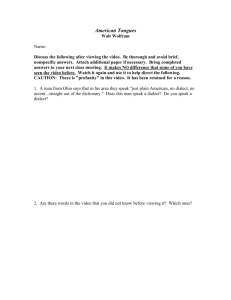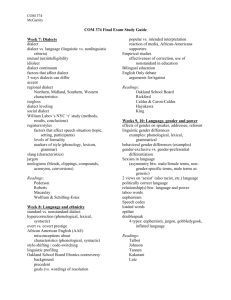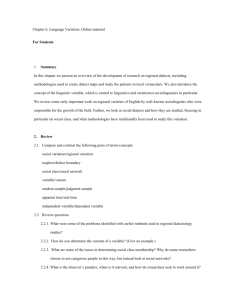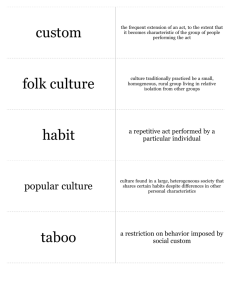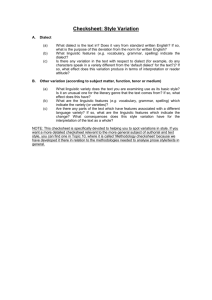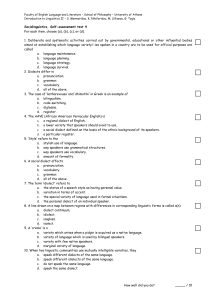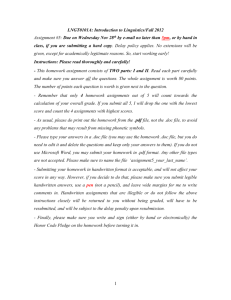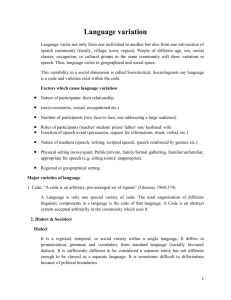SARAH D'ELOIA TEACHING STANDARD WRITTEN ENGLISH
advertisement
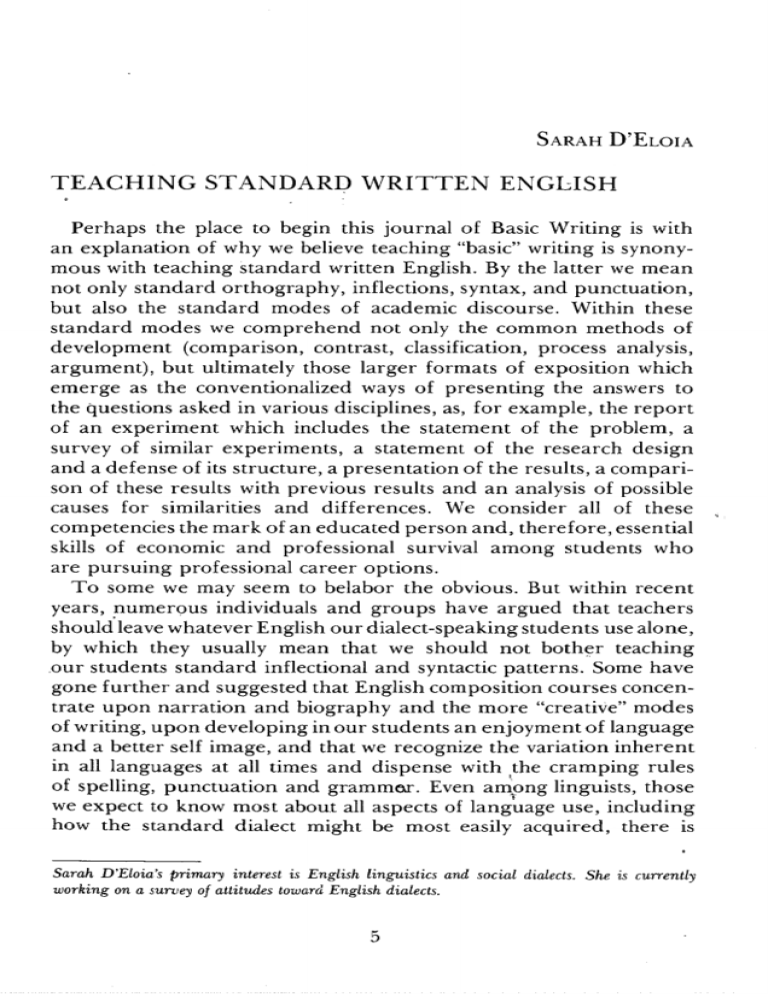
SARAH D'ELOIA TEACHING STANDARD WRITTEN ENGLISH Perhaps the place to begin this journal of Basic Writing is with an explanation of why we believe teaching "basic" writing is synonymous with teaching standard written English. By the latter we mean not only standard orthography, inflections, syntax, and punctuation, but also the standard modes of academic discourse. Within these standard modes we comprehend not only the common methods of development (comparison, contrast, classification, process analysis, argument), but ultimately those larger formats of exposition which emerge as the conventionalized ways of presenting the answers to the questions asked in various disciplines, as, for example, the report of an experiment which includes the statement of the problem, a survey of similar experiments, a statement of the research design and a defense of its structure, a presentation of the results, a comparison of these results with previous results and an analysis of possible causes for similarities and differences. We consider all of these competencies the mark of an educated person and, therefore, essential skills of economic and professional survival among students who are pursuing professional career options. To some we may seem to belabor the obvious. But within recent years, numerous individuals and groups have argued that teachers should. leave whatever English our dialect-speaking students use alone, by which they usually mean that we should not bother teaching .our students standard inflectional and syntactic patterns. Some have gone further and suggested that English composition courses concentrate upon narration and biography and the more "creative" modes of writing, upon developing in our students an enjoyment of language and a better self image, and that we recognize the variation inherent in all languages at all times and dispense with the cramping rules of spelling, punctuation and grammo.r. Even a~\ong linguists, those we expect to know most about all aspects of language use, including how the standard dialect might be most easily acquired, there is Sarah D'Eloia's primary interest is English linguistics and social dialects. She is currently working on a suroey of attitudes toward English dialects. 5 considerable disagreement about what to teach, how, when, and to whom. There is, however, among all parties an abundance of good will toward their dialect-using students (if not always toward each other) and considerable agreement about the desirable ends they wish to achieve, but through alternative courses of action. There are a number of arguments frequently advanced against the traditional emphasis on standard English in college composition. One of the arguments made against the traditional preoccupation with "standard" or "textbook" or "edited" English is that it ignores the linguistic fact that language use is comprised of an infinitely subtle continuum of styles, tones, and choices varying according to the circumstances of time, place, purpose, and shared context with one's hearers,-such as a conversation with a young child, a personal letter, a technical report, a lecture to a large group, a dirty joke, a left-handed compliment. The unrelenting emphasis on standard English, it is argued, ignores the variety, versatility and fluidity that is language, substituting for the realities of language use a single narrow, public dialect, useful within a rather narrow set of public circumstances. Further, it ignores, they argue, the real fluency our students have with other language varieties and with other modes of expression-personal narrative, poetry, etc. English teachers are, they argue, largely responsible for the inflexible, prissy notions of linguistic etiquette held by the general public and codified in the handbooks-and what previous generations of Miss Fidditches have done, this generation of teachers can undo. Many argue, and rightfully so, that all languages are structurally equal: no language or dialect is inherently any "better" than any other language or dialect in its grammar: no language is intrinsically any more "logical" or "illogical" in the way it segments reality into grammatical categories and combines grammatical categories into words, phrases, clauses, and sentences. Thus a language which lacks systematic past tense marking of the verb, like the English regular verb -ed, is not in the least handicapped provided the language has some other mechanism for indicating past-ness when the idea is needed, for example, words comparable to yesterday, last week, or ago. Similarly, within a language, a dialect of English which marks plurality only once (two boy, two pair) is not less logical than another which marks plurality twice (two boys, two pairs) or even th:t:ee tim.es (two boys go-, in which the absence of the third person singular present tense -s on the verb also indicates the subject is 'plural, particularly in the absence of a noun plural marker; as in the sheep 6 go-). Non-redundant plurals, multiple negatives, double comparatives and superlatives, and non-standard subject verb agreements are just as logical as their standard counterparts. Furthermore, questions of logic aside, every language is equal in its inherent resourcefulness: equally well adapted to the demands previously mad~ upon it by the uses given it and equal in the capacity to evolve whatever mechanisms are needed to communicate whatever meanings subsequently need to be communicated as new uses are given it. Since all dialects are equal in their logicalness and resourcefulness, this argument continues, there is absolutely no linguistic reason to compel a person to give up his native dialect. Indeed, to put the argument affirmatively and forcefully, every person has a right, not only to use his native dialect, but to use it with pride and self-respect, without being badgered by misguided educators to conform to a different dialect which can demonstrate no linguistic superiority. 9pponents of teaching the standard dialect point with real compassion to the psychic damage done to the student who is made to feel that the language he uses is "ignorant" and "low class" and a bad reflection on himself, his family and friends, his race, his entire background. And they argue that simply requiring the student to learn and use the standard dialect is to force him to form this negative opinion of himself, since merely to teach the standard is to imply that it and its users are "better" than his language and its users. And, they argue, the standard dialect is not inevitably better, not even for those academic, formal, expository purposes to which it has been, in the course of its historical development, especially adapted. They point to the directness, exuberance and vitality of various non-standard dialects, and to the prissiness, verbiage, and obfuscation that characterize the standard English of many middleclass high school and college students and government bureaucrats. Perhaps the most compelling arguments are the practical ones. And here those who oppose an emphasis on teaching the standard fall into two categories. The optimists maintain that the use of a dialect "seldom obscures clear, forceful writing," that the standard written dialect is really not important for large numbers of students, and that, for the "certain kinds" of students it is important for, "its features are easily identified and taught." 1 The pessimists take 1 "Students' Right to Their Own Language," College Composition and Communication, Special Issue, 25 (Fall 1974), p. 8. 7 the opposite view. They argue that the effort to teach standard English to lower class youths is largely futile, especially at the level of college composition. On the one hand, no amount of help or pressure from middle-class teachers will inspire a lower-class student to learn the standard where there is not, in addition, strong middle class or upward mobility pressure from his peer group, immediate family, or community, or where the person is not what is known in black street culture as a "lame"-a youth largely alienated from his peer group and the vernacular culture, with well-developed upward mobility aspirations. On the other hand, students who are going to learn the standard dialect will do so almost without regard to what teachers do or fail to do. They will simply imitate those forms of English to which they are exposed which they recognize as most prestigious. Even if a student is motivated to acquire the standard dialect, college is too late to begin. Dialect switching becomes increasingly difficult as a person grows older, and the ability to do so has already declined markedly by late adolescence. The ultimate argument is the argument from political and moral values, and these value judgments are the central assumptions from which the other arguments derive. Status seeking is judged an unworthy, morally demeaning pursuit, apparently unredeemed by any positive spinoff; it is a pillar of a corrupt social, political, and economic order which deserves to be undermined rather than shored up. In the view of prominent linguist James Sledd, educators who soak up state and federal revenues in projects to teach standard English as a second dialect are simply complicit in 1984-ish Big Brotherism. He argues that teachers of English have no business enforcing middle-class white linguistic prejudices, no business openly or tacitly endorsing the upward mobility rat race. He argues that linguistic change is the effect and not the cause of the social changes sought, and that there are far more important facts and values to be taught than those which foster social climbing. These are the facts and values which support social, political, and economic reorganization.2 We agree with the ends sought by the opponents of teaching standard English: a more equitable social order and the psychological 2 See James Sledd, "Bi-Dialectism: The Language of White Supremacy,~ English Journal, 58 (Dec. 1969), 1307-1315, and "Doublespeak: Dialectology in the Service of Big Brother," College English, 33 (1972), 439--456. 8 well-being of our students. However, we believe these ends are better served when students enjoy the wider range of options opened to them by fluency in the standard dialect. The question of values must come first. If one is persuaded that the business of the English teacher is more properly tea<;_:hing a radical critique of our present social order rather than equipping students with the language skills necessary to cope successfully in it, there is, indeed, little point to teaching standard English. However, to pursue the former course of action as the more moral, one must assume that our social order is changing so rapidly that .our students can safely ignore social dialect and class as well as racial discrimination and, more importantly, that they can safely ignore the demand for skills of a technological society. We do not believe either can safely be ignored. In the absence of this safety, two facts remain: It will be important that middle class Americans learn to tolerate a broader fpectrum of linguistic diversity, at the same time that upwardly aspiring minorities make linguistic accomodations toward the standard, especially in writing. While it is true that broad scale linguistic change is the product of social change, it is equally true that linguistic change toward control of the standard facilitates social mobility and social change for individuals. Secondly, whatever the political philosophy of the teacher, the values of the student must be given pre-eminence. All evidence indicates that most students, including those at City College, are in college because they wish to improve their economic and social status in life. Their decision to enter college and their perseverance in pursuing their degrees indicate a desire to participate in mainstream American culture, of which the standard written dialect is clearly a major component. To refuse or to fail to offer students the language competencies necessary for them to hold themselves forth as educated Americans is to deceive them about what they have obtained in their struggle to complete their educations and to deceive them about their economic and social prospects afterwards. If we have not delivered the goods, they cannot. Their struggle for a more secure life for themselves and their families does not deserve to be viewed merely as morally vacuous status-seeking. It lis the outgrowth of fundamental principles of our American democracy and can be sniffed at only by those or the descendents of those who have already come through the struggle successfully. Thirdly, we do not~deny the right of every student to use his native dialect with self-respect and pride, exclusively if he chooses, 9 nor do we believe that any person should be coerced into learning the standard written dialect. It is, however, simply fallacious to argue from the presumed stylistic weaknesses of the standard dialect to the presumed stylistic strengths of non-standard dialects: each has its "flavor"; each is capable of both obfuscation and directness. It is equally fallacious to confuse the linguistic equality of dialects with their social inequality. While we doubt that anyone can be taught standard English when he does not wish to learn it, we do believe that every person should have the opportunity to learn the standard written dialect, and that he should have the opportunity to do so in an environment in which the instruction is most likely to succeed. We believe it is possible to teach the standard dialect without inevitably doing psychological damage to the student, provided it is taught in an environment in which language differences are explored and celebrated rather than stigmatized. Students can and should be encouraged to view acquiring the standard dialect and retaining their native dialects as an opportunity for linguistic and cultural breadth, never as a painful choice between mutually exclusive alternatives. To the extent that students feel a healthy respect for what they already are as well as for what they, by their educations, hope to become, they minimize debilitating conflicts and feelings of disloyalty in their quest for upward mobility. For this reason we endorse approaches to teaching composition which recognize the variety of language, which give students opportunities for self-expression, creativity, and virtuoso performances within the varieties and modes of which they are already masters. All these contribute to their enjoyment, sense of verbal power, and self esteem. On the-other hand, great psychological damage is inevitably done when a student is cut off from the way of life he wishes to lead because he lacks the competencies expected in professional life. For us to shirk the more difficult job of teaching the standard dialect and the traditional modes of academic discourse is a serious mistake, for which our students pay the price. For these are precisely the varieties of language use to which the majority of our students lack access and which they are far more likely to need in their public capacities. However onerous the fact, however difficult it makes our job, the standard dialect does have its uses, its legitimacy, its special place on the continuum of language styles. Although this generation. of teachers can do a lot to eliminate the misconceptions popularly attached to other dialects, nothing it can do will eliminate the 'need for a public dialect-nor, because of the important public function 10 it fulfills, the status which automatically attaches to it and to those who can use it fluently. Finally, we believe that a decision not to teach the standard written dialect-its inflections, syntax, spelling, punctuation, vocabulary, the modes of public discourse which are its special domain, and the syntactically more complex, contextually and conceptually more e~plicit expository prose style which is their vehicle-is, at bottom, a vote of no confidence in the student. We reach this conclusion without sharing the optimists' view that the identifying characteristics of the standard written dialect are "easily identified and taught." We fiqd that the reverse is true. Too often it is easy enough to tell that a particular grammatical construction diverges from the standard written dialect, but almost impossible to determine, without considerable experience, whether or how it fits coherently into the student's native grammar, or how we can teach the complex constraints which determine the use of the standard equivalent. With painful frequency, we discover that we can not formulate these constraints ourselves. The difficulties are no fewer when the problem is not strictly grammatical. Long sequences of short simple sentences, lacking the subordination and coordination of related parts, are equally a mark of an immature command of the standard written dialect. How are we to give failsafe advice for correctly working out appropriate emphasis and the logical and syntactic relationships? And how do we teach another student to untangle the syntactic snarls he creates when he strains to extend his command over the more complex syntactic possibilities of the language? Finally, how do we persuade the student who produced the passage below that he has not produced public discourse, that however "correct" the passage, his real meanings remain inaccessible? As far as education is concerned, I had a little of the wrong kind. It wasn't that I wanted it. It was because I felt things a lot easier. I had no time to get what I really needed. But all I wanted at that time was money. Loving is something for my head. I had to know and deal with some of the best of people because I wanted some of the best. I figure if I am going to spend my time, it might as well be with some of the best. How do we teach him how to judge the degree of common ground he can assume? how far he must go in spelling out his meanings in detail? how many cues of place, sequence and reference he must build in? 11 On the other hand, we are not so pessimistic as the pessimists. We are far from despairing. In spite of the real difficulties of acquiring fluency in the standard written dialect, we believe there are legitimate reasons to believe that many of our students can succeed. Studies of the social stratification of speech and of the process of language acquisition support this conclusion. Speakers of all social classes within a speech community show considerable uniformity as to the spoken varieties of the language they consider prestigious and non-prestigious. These varieties differ not so much in the absolute presence or absence of stigmatized forms-such as tin and den for thin and then, double comparatives, etc.-as in the greater frequency of the stigmatized forms in the non-prestigious (non-standard) dialects, and in the informal colloquial levels of both dialects, the more prestigous dialect always having considerably fewer, usually fewer of the features in its most casual style than the non-prestigious dialects have in their most careful. Negative social judgments of speech are based on the relative frequency or infrequency of the stigmatized features, that is by their repetition and their clustering with other features into a predictable configuration. Many of these features also serve as cues to stylistic level, with the result that persons hearing the careful speech in a non-standard dialect may conclude it is the casual speech of a more prestigious one, and vice versa. Thus, while it is undeniably true that for most people it is far more difficult to acquire a second language or second dialect written or spoken, during late adolescence and early maturity, it is also true, with regard to second dialects, that many of the non-prestigious features are already under a measure of control, within the stylistic levels the student already uses. Thus, in some measure, acquiring the standard involves extending the use of cues already in his repetoire. The student may be able to reduce the level of error which derives from interference from his native grammatical code to the point that the stigmatized forms rarely obtrude themselves as "errors," and this is especially true when the occasional use of native forms occurs in the context of a well-developed, coherent, thought-provoking essay. Many of the characteristics of the expository prose style of the standard written dialect derive not from differences in the grammatical system or code per se, but from greater exploitation of the mechanisms creating syntactic complexity and explicitness i~hererit in the code, from access to more levels of vocabulary, and''from a stronger sense of the degree of shared context that may be assumed, 12 the depth of detail required to inform or persuade. These are problems common to all developing writers, and when these skills are mastered, the occasional dialect error passes almost unnoticed. It is to this level of competence with the standard written dialect that we hope to bring our students. 13
